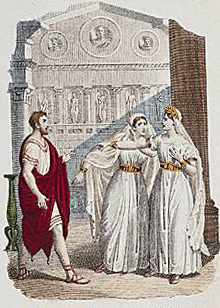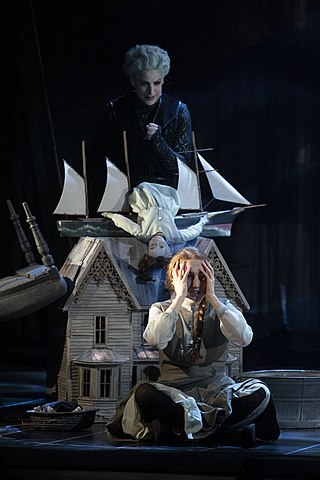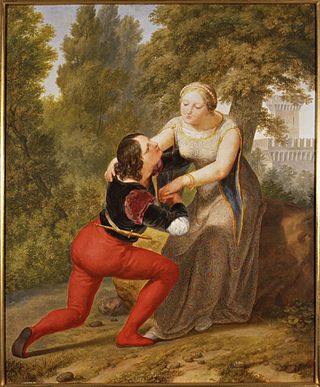| The Ballad of Baby Doe | |
|---|---|
| Opera by Douglas Moore | |
| Librettist | John Latouche |
| Language | English |
| Premiere | |
The Ballad of Baby Doe is an opera by the American composer Douglas Moore that uses an English-language libretto by John Latouche. It is Moore's most famous opera and one of the few American operas to be in the standard repertory. Especially famous are the title heroine's five arias: "Letter Aria," "Willow Song," "I Knew it Was Wrong", "Gold is a Fine Thing", and "Always Through the Changing." Horace Tabor's "Warm as the Autumn Light" is also frequently heard. Distinguished sopranos who have portrayed Baby Doe include Beverly Sills (Moore's favorite interpreter of the role), Ruth Welting, Karan Armstrong, Faith Esham, and Elizabeth Futral.
The opera's premiere took place at the Central City Opera in Colorado in 1956. Hanya Holm and Edwin Levy directed the production, and sopranos Dolores Wilson and Leyna Gabriele alternated in the title role. The opera's New York premiere, directed by Vladimir Rosing, was presented at the New York City Opera in 1958. This revised version added the gambling scene in Act 2 and an additional aria for Baby Doe. Further revisions were being considered, but these were abandoned upon the sudden death of Latouche.
Based on the lives of historical figures Horace Tabor, a wealthy mine owner; his wife Augusta Tabor, and Elizabeth "Baby" Doe Tabor, the opera explores their lives from Horace and Baby Doe's meeting to the death of Horace. "Always Through the Changing" is a postscript ending foretelling Baby's death.
| Role [1] | Voice type [1] | Premiere Cast, [2] 7 July 1956 (Conductor: Emerson Buckley) |
|---|---|---|
| Elizabeth "Baby" Doe | soprano | Dolores Wilson |
| Horace Tabor | baritone | Walter Cassel |
| Augusta Tabor | mezzo-soprano | Martha Lipton |
| Mama McCourt | contralto | Beatrice Krebs |
| Samantha | soprano | Joyce Maiselsen |
| Silver Dollar | soprano | Patricia Kavan |
| William Jennings Bryan | bass-baritone | Lawrence Davidson |
| President Chester Arthur | tenor | Alan Smith |
| Father Chapelle | tenor | Howard Fried |
| Old Silver Miner, Clerk at the Claredon Hotel, Mayor of Leadville, Stage Doorman, Sam, Bushy, Two Washington Dandies | tenors | |
| Sarah, Mary, and Kate | sopranos | |
| Elizabeth | child soprano | |
| Adult Silver Dollar, Emily, Effie, Samantha | mezzo-sopranos | |
| Bouncer, Albert, Hotel Footman, Denver Politician, Barney, Jacob, Two Washington Dandies | baritones | |
| Child Silver Dollar | silent role | |
The story begins by commenting on the riches of the Matchless Mine and Horace Tabor's ownership and control over the whole town of Leadville, Colorado. Horace sings "It's a Bang Up Job" to the townspeople, praising his new opera house, and sharing his disenchantment with his wife Augusta. During intermission at a performance at the opera house, Augusta chides Horace for not acting according to his upper-class station in life. Horace pleads with her not to insult the common people, equating the prostitutes' and bar girls' work to the work her committee did in helping build the opera house. Near the end of intermission, a woman arrives, introduces herself to Horace, and asks if he could direct her to her hotel. He obliges her, and returns to the opera with Augusta.
Augusta retires for the evening, while Horace steps outside to smoke a cigar. He overhears two women speaking about the woman he helped and learns that her name is Baby Doe, and that she has a husband in Central City. Horace hears Baby singing "The Willow Song" and applauds her. She is surprised as she did not know he was listening. He sings "Warm as the Autumn Light" to her. Augusta's comments from upstairs stop the scene.
Several months later, Augusta goes through Horace's study and finds gloves and a love letter. She thinks they are for her until she realizes that they are for Baby Doe. The rumors have been true. Horace comes in, they fight, and Horace says he never meant to hurt her.
Baby Doe, at the hotel, realizes she must end her relationship with Horace. She asks the hotel workers to find out when the next train leaves for Denver. They go to find Horace so he can head her off. She sings of her love for Horace in a letter to her mother (the "Letter Aria"). Augusta comes in and tells Baby to leave. She agrees, but pleads that she and Horace have done nothing they should be ashamed of ("I Knew It Was Wrong"). After Augusta leaves, Baby decides against leaving when Horace arrives. They sing of their love.
A year later, Horace has left Augusta and is living with Baby Doe. Her friends tell Augusta, now living in Denver, that Horace plans to divorce her. She swears to ruin him.
Horace and Baby Doe's wedding party is set in Washington DC. Baby's mother praises the couple's riches, but society wives deride Baby Doe. When the couple enter, they are formally well received. The debate turns to the silver standard, and Baby Doe sings "The Silver Aria". Horace presents Baby with the Spanish Queen Isabella's historic diamond necklace. Baby Doe's mother tells the Roman Catholic priest about Baby and Horace's divorces—which he didn't know of. Scandal rocks the party, but simmers down when President of the United States Chester Arthur comes in and toasts the couple.
Act II chronicles the disintegration of Baby and Horace's riches. Augusta warns of the gold standard, but Horace doesn't listen. Horace politically backs William Jennings Bryan for president. When Bryan loses, Horace is abandoned by his party.
In the final scenes, Horace asks to see the opera house he built so long ago, although he no longer owns it. On the stage, he hallucinates and sees people from his past. Augusta both taunts and pleads with him. He is told that one of his daughters will decry the name Tabor and the other will become a prostitute. Distraught, he collapses. Baby Doe enters. After he is convinced that she is not a hallucination, he tells her nothing will come between them, and begs her to remember him. He dies in her arms.
In the last scene, which takes place 30 years later at the Matchless Mine, she finishes the opera with "Always Through the Changing."
| Year | Cast (Baby Doe, Horace, Augusta, Chester A. Arthur, William Jennings Bryan, Mama McCourt, Father Chapelle) | Conductor, Opera house and orchestra | Label [1] |
|---|---|---|---|
| 1959, June 1–30 studio: Manhattan Center | Beverly Sills Walter Cassel Frances Bible Jack DeLon Joshua Hecht Beatrice Krebs Grant Williams | Emerson Buckley Chorus and Orchestra of New York City Opera [1] | LP: MGM Records; CD: re-released by Deutsche Grammophon in 1999 and 2006 [1] |
| 1976, April 21 filmed in New York | Ruth Welting Richard Fredricks Frances Bible David Griffith Richard McKee Jane Shaulis Howard Hensel | Judith Somogi Chorus and Orchestra of New York City Opera [1] | Video Recording for American television: Broadcast on PBS's Live from Lincoln Center [1] |
| 1996, Aug 1-31 studio: Central City Opera House | Jan Grissom Brian Steele Dana Krueger Torrance Blaisdell Mark Freiman Myrna Paris | John Moriarty Chorus and Orchestra of Central City Opera [1] | CD: Newport Classic [1] |
| 2000 live in San Francisco | Ruth Ann Swenson James Morris Judith Forst | Stefan Lano Chorus and Orchestra of San Francisco Opera | CD: Premiere Opera CDR 1085-2 |
| 2001 live in New York | Elizabeth Futral Mark Delavan Joyce Castle | George Manahan Chorus and Orchestra of New York City Opera | CD: Premiere Opera CDR 7841-2 |

Leadville is a statutory city that is the county seat, the most populous community, and the only incorporated municipality in Lake County, Colorado, United States. The city population was 2,633 at the 2020 census. It is situated at an elevation of 10,158 feet (3,096 m). Leadville is the highest incorporated city in the United States and is surrounded by two of the tallest peaks in the state.

I puritani is an 1835 opera by Vincenzo Bellini. It was originally written in two acts and later changed to three acts on the advice of Gioachino Rossini, with whom the young composer had become friends. The music was set to a libretto by Count Carlo Pepoli, an Italian émigré poet whom Bellini had met at a salon run by the exile Princess Belgiojoso, which became a meeting place for many Italian revolutionaries. The opera is based on Têtes Rondes et Cavaliers, a historical play written by Jacques-François Ancelot and Joseph Xavier Saintine and set in the English Civil War, which some sources state was based on Walter Scott's 1816 novel Old Mortality, while others state that there is no connection.

Norma is a tragedia lirica or opera in two acts by Vincenzo Bellini with libretto by Felice Romani after the play Norma, ou L'infanticide by Alexandre Soumet. It was first produced at La Scala in Milan on 26 December 1831.

Alcina is a 1735 opera seria by George Frideric Handel. Handel used the libretto of L'isola di Alcina, an opera that was set in 1728 in Rome by Riccardo Broschi, which he acquired the year after during his travels in Italy. Partly altered for better conformity, the story was originally taken from Ludovico Ariosto's Orlando furioso, an epic poem. The opera contains several musical sequences with opportunity for dance: these were composed for dancer Marie Sallé.

Eugene Onegin, Op. 24, is an opera in 3 acts, composed by Pyotr Ilyich Tchaikovsky. The libretto, organised by the composer himself, very closely follows certain passages in Alexander Pushkin's 1825–1832 novel in verse, retaining much of his poetry. Tchaikovsky's friend Konstantin Shilovsky contributed M. Triquet's verses in Act 2, Scene 1, while Tchaikovsky himself arranged the text for Lensky's arioso in Act 1, Scene 1, and almost all of Prince Gremin's aria in Act 3, Scene 1.
John Treville Latouche (La Touche) (November 13, 1914, Baltimore, Maryland – August 7, 1956, Calais, Vermont) was a lyricist and bookwriter in American musical theater.

The Turn of the Screw is a 20th-century English chamber opera composed by Benjamin Britten, with a libretto by Myfanwy Piper, based on the 1898 novella The Turn of the Screw by Henry James.

Horace Austin Warner "Haw" Tabor, also known as The Bonanza King of Leadville and The Silver King, was an American prospector, businessman, and Republican politician. His success in Leadville, Colorado's silver mines made him one of the wealthiest men in Colorado. He purchased more mining enterprises throughout Colorado and the Southwestern United States, and he was a philanthropist. After the collapse in the silver market during the Panic of 1893, Tabor was financially devastated. He lost most of his holdings, and he labored in the mines. In his last year, he was the postmaster of Denver.

The Central City Opera House is located in the Central City/Black Hawk Historic District in Central City, Colorado, United States. It was constructed in 1878. It has offered operatic and theatrical productions that drew prominent actors and performers in the late 19th-century, and in the early 20th-century it was a motion picture theater.

Street Scene is an American opera by Kurt Weill (music), Langston Hughes (lyrics), and Elmer Rice (book). Written in 1946 and premiered in Philadelphia that year, Street Scene is based on the Pulitzer Prize-winning 1929 play of the same name by Rice.

Beatrice di Tenda is a tragic opera in two acts by Vincenzo Bellini, from a libretto by Felice Romani, after the play of the same name by Carlo Tedaldi Fores.

Bajazet is an Italian opera in 3 acts composed by Antonio Vivaldi in 1735. Its libretto was written by Agostino Piovene. It was premiered in Verona, during the Carnival season of that year. It includes a three-movement sinfonia as an introduction. The story is about the fate of Bajazet after being captured by Tamerlane. The famous aria "Sposa son disprezzata" is from this opera.

Elizabeth McCourt Tabor, better known as Baby Doe, was the second wife of Colorado pioneer businessman Horace Tabor. Her rags-to-riches and back to rags again story made her a well-known figure in her own day, and inspired an opera and a Hollywood movie based on her life.

Frances Lillian Bible was an American operatic mezzo-soprano who had a thirty-year career at the New York City Opera between 1948 and 1978. She also made a number of opera appearances with other companies throughout the United States, but only made a limited number of appearances abroad. Martin Bernheimer wrote in Opera News that, "Frances Bible was cheated by destiny. She never quite achieved the international recognition she deserved. Bible had it all—a mellow, wide-ranging mezzo-soprano, an attractive stage presence, genuine theatrical flair, a probing mind and a technique that allowed her to sing bel-canto filigree one night, Verdian drama the next. She was one of the rare American singers who savor the English language. She understood the value of economy, never stooping to easy effects. Perhaps she was too versatile, too tasteful and — dare one say it? — too intelligent for her own good."

Silver Dollar is a 1932 American pre-Code biographical film starring Edward G. Robinson, Bebe Daniels and Aline MacMahon. Based on David Karsner's biography of the same name, it tells the story of the rise and fall of Horace Tabor, a silver tycoon in 19th century Colorado.

The Matchless Mine is a historic mine located in Lake County, Colorado. It is listed on the National Register of Historic Places, and is part of the National Mining Hall of Fame and Museum.

Augusta Pierce Tabor was the wife of a merchant and miner, Horace Tabor, the first white woman to live in the Idaho Springs mining camp, and a Denver philanthropist. She was inducted into the Colorado Women's Hall of Fame in 1991 for her contributions to social service and philanthropy.
The Shining is an American opera in two acts and an epilogue, with music by composer Paul Moravec and a libretto by Mark Campbell, based on the 1977 novel by Stephen King. The opera received its world premiere on May 7, 2016 at the Ordway Music Theater, Saint Paul, Minnesota. It is part of the "New Works Initiative" of Minnesota Opera.

Caroline Bancroft was a journalist. She is known for the books and booklets that she wrote about Colorado's history and its pioneers. In 1990, she was inducted into the Colorado Women's Hall of Fame.
Magdalena Wór is a Polish opera singer (mezzo-soprano).